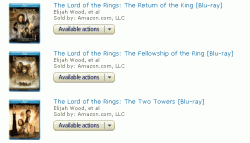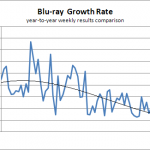Another week, another WNR. I know it’s easy to get cynical about the Black Friday sales in the US (particularly if, you’re like me, not actually located in the US), just like it may be easy to get caught up in the hype, but if you’re do your research, there are potentially a lot of bargains to pick up without leaving the comfort of your home. Since Blu-ray is a major topic of this website, I’ve posted some of the best Amazon Black Friday Blu-ray deals on this page. Most of the discounts are still available, and there will be more on Monday as well, so it’s a good time to stock up on some Blu-ray movies. The prices are so good that they’re almost HD DVD level! I’ve purchase a dozen of so movies myself as part of this sale, as there are some really good bargains around for the movies that I had planned to buy anyway (and that’s the the trap, is that you end up buying things you didn’t really want or need just because they were cheap). More on this in the HD/Blu-ray section of this WNR, including one confession about how I compromised my principles a bit!
I continue to play through Fallout New Vegas, encountering another quite annoying glitch during the week. This one involved the companion Veronica, and how she become frozen in one spot after a certain mission. And this leads me to recommend one most excellent resource for Fallout games, The Value. It is a Wikia for all the Fallout games, and it gives precious advice on how to overcome glitches. And this is also why I prefer playing Fallout on the PC, because you get access to the console, and this allows you to fix the most stubborn glitches. In any case, I solve the Veronica glitch after reading a tip on The Vault. The glitches in this game almost ruin the game, but it’s actually quite satisfying when you do find a solution or workaround, and it has become part of the Fallout/Bethesda experience really.
Not a huge amount of news by any standard, but still enough to do some ranting, possibly between the 1800 and 2400 word mark, by my best guestimate. So let’s get started.

In copyright news, news broke not too long ago that The Pirate Bay founders have lost their appeal in the Swedish courts. This means that, following the original verdict, the founders now face a hefty fine and prison time of up to 10 month.
Only three of the original four defendants were part of this trial, the other missed out due to illness, but will be certain to face the exact same result. Despite jail time being handed out, the likes of the MPAA are still not satisfied at the result, claiming that the $6.5 million dollars of damages isn’t anywhere near the $17 million they had wanted. Talk about being greedy! The case will now most likely go to the highest court in Sweden, even if the prosecutors seem to think this case won’t go that far. I can’t be bothered to dig up the previous edition of the WNR where I said that this case won’t be decided until it is examined by the highest court in the country, and I think I also mentioned that I don’t hold much hope that any appeal would yield satisfactory results for the TPB. The cards were stacked against them from the start.
The copyright news this week doesn’t really get much better unfortunately, but there was at least one bright spot when there was at least a sign of common sense on Capitol Hill this week, when US Senator Ron Wyden (D-OR) torpedoed efforts to enact the controversial Combating Online Infringement and Counterfeits Act (COICA) into law. He has placed a hold on it and it won’t be heard before the senate until next year. Unfortunately, I can only see this as a temporary delay, because with so much support for this ridiculous act, it will be made into law and we’ll all have to suffer the consequences. Most support it because they don’t know any better, or have received enough incentive to support it without asking serious questions. And most know there’s no political points being earned by going against the entertainment industry in the US. And that’s partly our fault too, for not pressuring out representatives in government in doing the right thing. But the thing is, unless you’re someone who reads this or similar blogs and websites regularly, you won’t really be aware of the issues, or understand (or care) about them, and it then boils down to an issue of whether people should or shouldn’t “steal” (a dumbed down talking point that the entertainment industry has been pushing), and most people wouldn’t support stealing. Except we know that copying and stealing are two different things entirely, and that even if it is possible to stop piracy (it isn’t), there are certain things that are far more sacred than protecting the dying business model of the entertainment industry. Things like our right to privacy. And freedom of speech. And due process, which systems like ‘Three Strikes’ attempt to short-circuit by assuming guilt and denying people their right of appeal (or to even address the matter in a court of law, like they’re entitled to). And this goes back to what I said a couple of WNRs ago, that we must do more to protect our rights and treat this more than just a matter of being able to “downloading movies and games and stuff”, something that the copyright lobby and their supporters has tried to reduce the arguments to. This is about protecting our democratic rights, which politicians these days are too eager to sacrifice in the name of “protecting” us (whether it’s terrorism, or the perceived and possibly imaginary threat to the economy, due to piracy).
And so we move on to the news this week that Homeland Security closed down another 80 websites suspected of providing pirated content. The only positive is that due process was followed, that warrants were obtained via the court, but it doesn’t really matter if the process itself is flawed. My biggest problem with this is that I have no idea if any of the websites/domains seized were really illegal, and who determined their status. I don’t trust most judges’ level of technical understanding to pass judgement on technical issues such as this, and perhaps when faced with such overwhelming force (Justice Department, Homeland Security, ICE), and some scaremongering about the consequences of piracy (billions of jobs will be lost!), most will just go along with whatever is in the warrant request. And if one of the 80 websites was truly innocent, what’s the process of appeal, and what kind of compensation would be due if the website was deemed by a court of law as not guilty, compensation for the financial and emotional damages caused by the temporary closure of the website. I mean, this is not like going after drug dealers or counterfeit drugs, there are a lot of complicated issues involved in determining whether a website is guilty or not of copyright infringement, issues that must be addressed in court before any punitive actions can be handed out. And what if the domain really did host illegal stuff, but it was uploaded unknowingly by third parties, or as part of a user-generated section on the website – is if fair that the entire domain is taken offline? It would be like shutting down blogger.com because somebody created an account on there to share pirated MP3s. This scenario could be avoided via a DMCA takedown notice, but these seizures bypass the very laws that were created to avoid situations like this. And this is why COICA is so controversial, in that it gives the US government even greater power to do all of this and more, and on a much larger scale as well, potentially killing off tens of thousands of websites in one fell swoop, and many by “collateral damage”. And this is why anyone who knows and cares about the Internet ought to be against COICA, and many prominent companies and individuals have already spoken out, but all will be silenced by the constant chattering of lobbyists into the ears of those that can decide the fate of COICA. Senator Wyden excepted.
And so the next step would be to even make talking about piracy illegal, which is what the RIAA attempted to do this week, and caused some collateral damage of their own in the process. PCMag.com posted an article after LimeWire was shut down, examining the possible alternatives that are still left. This is a valid discussion, because it points to the fact that even though it took years and millions of dollars to bring down LimeWire, the next LimeWire could pop up in a matter of weeks or could already exist, and thus making the whole process an expensive, and pointless, exercise. And for this, the RIAA and its cohorts sent a letter to PCMag.com’s CEO, attacking the website for daring to suggest alternatives and supporting and encouraging piracy in the process. It then attacked PCMag for simply referring to another article, published by TorrentFreak, regarding LimeWire being resurrected. The problem is that PCMag didn’t write that article, it was PC World, by facts and accuracy does not matter when one is acting the bully like the RIAA and Co. are. PCMag are standing firm by their journalistic principles, and refuse to be silenced and used as a scapegoat in the RIAA’s attempt to blame someone, anyone, for the piracy problem. Anyone except for themselves for sticking with a dying business model, even when alternatives and opportunities were presented, opportunities that were eventually taken by the likes of Apple with iTunes. The only bit of innovation the RIAA and its members have come up with recently has been new ways to sue and intimidate those perceived to be their enemies (the Internet and anyone who uses the Internet), and of course the whole failed DRM experiment.
And DRM has been in the news this week too, but in regards to the use of it in the gaming industry. Gamasutra, one of the most respected gaming industry website on the Internet, has had one of its bloggers write an interesting article examining the failure of DRM, and how illegal copying can be prevented. The conclusion seems to be one that I’ve come to as well, in that the solution is to add value to the gaming experience, not to take it away via horrible DRM. Value adding explains the success of Steam, and even though it does use DRM, it is pretty weak stuff, and in fact probably better than buying off the shelve due to the lack of need of a DVD check. The best DRM should prevent casual copying, but should otherwise be invisible to the end user, and if it forces gamers to connect to an online service for authentication, free value added services should be given as compensation (achievements, community, social features …). But even the best, or worst (as in draconian), DRM will not prevent copying by those that really want to copy it, and groups with the skill to hack away, as Ubisoft’s DRM experiment showed recently, and so really, there’s no point to DRM at all. And this is a point shared by at least some game developers, including the developer of The Witcher series, and operators of the classic, DRM-free, gaming website GOG.com. In fact, their CEO and co-founder, Marcin Iwiński, goes on to say that DRM treats customers like criminals. Iwiński believes there’s no need to debate whether their upcoming game, The Witcher 2, should use DRM or not, simply because he believes DRM doesn’t work. And this is why The Witcher 2 will be released DRM-free. Iwiński also criticized the way DRM adds restrictions that the pirated versions are free from, calling it “totally stupid”. He also attacks online based protection, saying that it isn’t fair to people who want to play games when they’re away from a reliable Internet connection. And it’s hard to argue against any of these points really. The industry, when it relies on DRM, is basically trying to sell something that’s not as good as the pirated version even when you don’t consider the price, and then getting mad when it’s not selling well. I mean this is an industry that isn’t even bothering to print manuals any more, and yet it expects us to jump through hoops just to play a badly bugged game that it rushed through testing. But luckily, there are still the smarter companies that are doing more innovative things to stop piracy, things like bundling physical collector’s items that can’t be pirated, building immersive online experiences and communities, being innovative with pricing, and either not using DRM or at least not overdoing it. And then you have companies like Ubisoft.

Moving on from the ranting to happier grounds, as mentioned before, I did take part in the Black Friday sales on Amazon, trying to take advantage of the historically favourable AUD/USD exchange rates (not as favourable to be honest this week).
And yes, I did completely compromise my principles on an issue I’ve ranted about a lot right here. That’s right, I purchased the theatrical Blu-ray version of The Lord of the Rings movies, despite bitching about it for weeks back when it was first released. My rant then was about how the trilogy boxset should have included the extended edition, as opposed to the theatrical edition, and should have at least featured some new extra features and put them on Blu-ray at least even if they weren’t HD (the extra features are actually on DVDs, and probably could have fitted onto a single dual layer Blu-ray, but that would have made the boxset look famished). Also, the first movie had a sub-standard transfer, although some of it was unavoidable it seems (a fact that wasn’t available at the time of my original rant). In my defence, I didn’t buy the box set, but only the individual movies separately for $7.99 each. And at that price, some of these shortcomings, can be forgiven (certainly better than paying $65 for the boxset anyway). So “I won’t be buying it” really meant “I won’t be buying it unless it’s heavily discounted and I must join in the hype of Black Friday or I will feel left out”.
Well, at least I didn’t pay $400 for a copy of Avatar on 3D Blu-ray.
![]()
Kinect is in the news again this week, and funnily, it had almost nothing to do with gaming. The news broke last week that only a week after the release of Kinect, it had been hacked, and Microsoft couldn’t have been pleased at the development.
Then it turn out that they didn’t really care either way, because the “hack” wasn’t really a hack at all, at least according to Microsoft’s definition of what a hack is. What happened was that somebody wrote open source drivers for Kinect so that it can be used on the PC, and because Microsoft intentionally (or they claim now) left the USB thingy open, Microsoft claims they were always hoping something like this would happen. I’m not sure about that, but Microsoft do have a history of mixing Xbox 360 and PC compatibility (the wired Xbox 360 gamepad works perfectly on the PC, and even the wireless one can be made to work via a dongle). And “unofficial” drivers aren’t new, the Sony Sixaxis controller has a PC driver, and even the Wii-mote has one too.
Anyway, what was more interesting was how people decided to use the open source drivers and write their own PC based Kinect applications. And if you follow the link above, you’ll see videos of object recognition, a Minority Report style web browsing experience using a simple Javascript add-on. And even a man boob tracker (not a typo). It just goes to show that Kinect has serious potential, but only if the right software is there for it. But that’s always the hard part, and the reason why the Wii is struggling now is because, apart from Nintendo, nobody really knows how to makes good games for it.
And I was way off. I’m already over the 2700 word mark, and so my guestimate wasn’t really close at all. But if you remove the Black Friday and Fallout related waffle, then it just about gets in there. So I probably should stop typing now, wish you all a great week, and type something along the lines of “see you next week”.
See you next week.



















